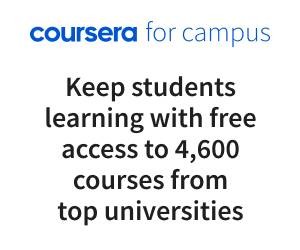Digital education and flexible teaching and learning models will help deliver the continuous learning individuals need to thrive in a disrupted economy
Universities are adapting course delivery as learners recognise the need to invest in their own reskilling to meet the demands of a rapidly changing workforce.
Experts from India’s tertiary education sector joined a Times Higher Education webinar, held in partnership with Coursera for Campus, to discuss digital education’s role in upskilling and reskilling India’s present and future workforce.
Raghav Gupta, managing director of India and APAC at Coursera, said data from Coursera’s 85 million learners and 6,000 institutions suggested that the industry had undergone “double disruption” since the start of the Covid-19 crisis.
“Automation was already happening, and Covid accelerated a lot of what automation was already doing,” he said.
The World Economic Forum has estimated that 85 million jobs could be displaced by the rise of automation by 2025. More than 80 per cent of companies want to reskill their employees, Gupta said, and 90 per cent of Indian businesses are accelerating digitalisation.
“What this means is that the kinds of skills that students will need in the future will be more digital-oriented and more data-oriented,” Gupta said.
Chair Ashton Wenborn, special projects deputy editor at THE, said there was a growing demand for institutions to offer individuals education at any stage of their lives. She asked the panel if their institutions had experienced this demand for lifelong learning.
Dwarika Prasad Uniyal, pro vice-chancellor of RV University, said individuals, particularly in the past couple of years, “have realised that they are becoming redundant in the larger work environment”.
“They realise that they’re not being able to keep pace with what is happening in the changing nature of the workforce,” Uniyal said. “The biggest change which I have seen has come in skilling, in that individuals have taken the responsibility of reskilling themselves. Suddenly, it’s not funded by organisations.”
Sasmita Samanta, pro vice-chancellor of Kalinga Institute of Industrial Technology, said the requirement for “continuous learning” was not new, but she agreed there had been a shift in where the retraining was coming from.
“We have found that this responsibility has come to the domain of academic institutions in the past three years,” she said. “Reskilling and upskilling and educating people in the workplace, that was always the job of industries or the professional institutions.”
Under India’s new education policy framework, Samanta and Uniyal both said, institutions were taking the chance to offer flexible learning models, including credit-based, modular education.
“It’s a challenge for us to start incorporating a lot of this modularity,” Uniyal said. “More importantly, it allows us to provide exceedingly high-quality course content from Moocs and large platforms. We can curate, rather than create, that content where we might not have the capability.”
Despite the challenges of the disrupted economy, Gupta said opportunities existed for those committed to upskilling. He cited Microsoft research that found that 150 million new tech or tech-adjacent jobs would be created in the next five years.
“Many organisations are finding that institutions will play an even bigger role when it comes to skilling working professionals for the future of work,” he said.
Watch the webinar on demand above or on the THE Connect YouTube channel.
Find out more about Coursera for Campus.










































































